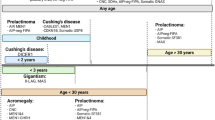Abstract
Background: Mutations of the genes encoding the α subunit of the stimulatory G protein (Gs) and of the inhibiting Gi2 protein (GNAS1 and GNAI2 genes, respectively) have been described in various endocrine neoplasias, including pituitary tumors. Aim: To search for mutations of GNAS1 and GNAI2 in a continuous series of nonfunctioning pituitary adenoma (NFPA) patients neurosurgically treated. Subjects and methods: The surgical samples of 22 patients who have been defined and characterized on a clinical, biochemical, histological, and immunohistochemical point of view have been processed for investigating the presence of the above mutations by PCR amplification of the hot spots exons 8 and 9 of GNAS1, and exons 5 and 6 of GNAI2, followed by direct sequencing. Moreover, the promoter region of GNAI2, in order to assess the prevalence of single nucleotide polymorphisms (SNP), was investigated in the same series. Results: A CGT>TGT mutation at codon 201 of GNAS1 gene in a single case of NFPA was found, but no mutation of GNAI2A was demonstrated. Conclusions: This finding suggests and confirms that G-protein mutations are rare and not crucial in NFPA development. Additionally, we found a silent SNP at codon 318 in the promoter of the Gi2α gene in one out of the 22 NFPA.
Similar content being viewed by others
References
Gittoes NJ. Current perspectives on the pathogenesis of clinically nonfunctioning pituitary tumours. J Endocrinol 1998, 157: 177–86.
Alexander JM, Biller BM, Bikkal H, Zervas NT, Arnold A, Klibanski A. Clinically nonfunctioning pituitary tumors are monoclonal in origin. J Clin Invest 1990, 86: 336–40.
Herman V, Fagin J, Gonsky R, Kovacs K, Melmed S. Clonal origin of pituitary adenomas. J Clin Endocrinol Metab 1990, 71: 1427–33.
Asa SL, Ezzat S. The pathogenesis of pituitary tumours. Nat Rev Cancer 2002, 2: 836–49.
Levy A, Lightman S. Molecular defects in the pathogenesis of pituitary tumours. Front Neuroendocrinol 2003, 24: 94–127.
Lania A, Mantovani G, Spada A. Genetics of pituitary tumours: focus on G-protein mutations. Exp Biol Med (Maywood) 2003, 228: 1004–17.
Landis CA, Harsh G, Lyons J, Davis RL, McCormick F, Bourne HR. Clinical characteristics of acromegalic patients whose pituitary tumors contain mutant Gs protein. J Clin Endocrinol Metab 1990, 71: 1416–20.
Spada A, Arosio M, Bochicchio D, et al. Clinical, biochemical, and morphological correlates in patients bearing growth hormone-secreting pituitary tumors with or without constitutively activated adenylyl cyclase. J Clin Endocrinol Metab 1990, 71: 1421–6.
Tordjman K, Stern N, Ouaknine G, et al. Activating mutations of the Gs alpha-gene in non-functioning pituitary tumors. J Clin Endocrinol Metab 1993, 77: 765–9.
Williamson EA, Daniels M, Kendall-Taylor P, Harris PE. Gs alpha and Gi alpha mutations in ‘non-functioning’ pituitary tumours. Clin Endocrinol (Oxf) 1994, 41: 815–20.
Kan B, Esapa C, Sipahi T, et al. G protein mutations in pituitary tumors: a study on Turkish patients. Pituitary 2003, 6: 75–80.
Williamson EA, Harrison D, Ince PG, Kendall-Taylor P, Harris PE. G-protein mutations in human pituitary adrenocorticotrophin hormone-secreting adenomas. Eur J Clin Invest 1995, 25: 128–31.
Boston BA, Mandel S, LaFranchi S, Bliziotes M. Activating mutation in the stimulatory guanine nucleotide-binding protein in an infant with Cushing’s syndrome and nodular adrenal hyperplasia. J Clin Endocrinol Metab 1994, 79: 890–3.
Petersenn S, Heyens M, Lüdecke DK, Beil FU, Schulte HM. Absence of somatostatin receptor type 2 A mutations and gip oncogene in pituitary somatotroph adenomas. Clin Endocrinol (Oxf) 2000, 52: 35–42.
Santarpia L, El-Naggar AK, Cote GJ, Myers JN, Sherman SI. Phosphatidylinositol 3-kinase/akt and ras/raf-mitogen-activated protein kinase pathway mutations in anaplastic thyroid cancer. J Clin Endocrinol Metab 2008, 93: 278–84.
Ballaré E, Mantovani S, Bassetti M, Lania A, Spada A. Immunodetection of G proteins in human pituitary adenomas: evidence for a low expression of proteins of the Gi subfamily. Eur J Endocrinol 1997, 137: 482–9.
Menzaghi C, Paroni G, De Bonis C, et al. The −318 C>G single-nucleotide polymorphism in GNAI2 gene promoter region impairs transcriptional activity through specific binding of Sp 1 transcription factor and is associated with high blood pressure in Caucasians from Italy. J Am Soc Nephrol 2006, 17 (Suppl 2): SI15–9.
Zhang X, Horwitz GA, Heaney AP, et al. Pituitary tumor transforming gene (PTTG) expression in pituitary adenomas. J Clin Endocrinol Metab 1999, 84: 761–7.
Author information
Authors and Affiliations
Corresponding author
Additional information
R.M. Ruggeri and L Santarpia equally contributed to this work.
Rights and permissions
About this article
Cite this article
Ruggeri, R.M., Santarpia, L., Curtò, L. et al. Non-functioning pituitary adenomas infrequently harbor G-protein gene mutations. J Endocrinol Invest 31, 946–949 (2008). https://doi.org/10.1007/BF03345630
Accepted:
Published:
Issue Date:
DOI: https://doi.org/10.1007/BF03345630




